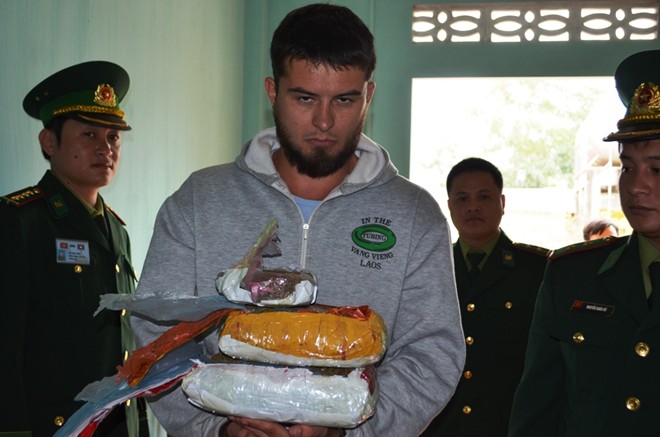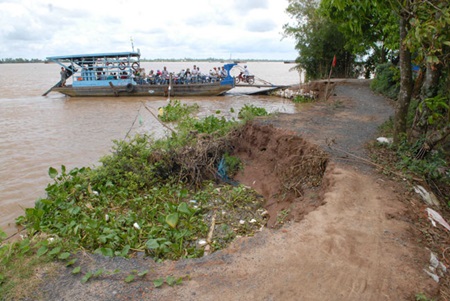Russian Interpol fugitive caught by border guards

Lao Bao border guards in central Vietnam have apprehended a Russian national who has been wanted by Interpol for transnational drug trafficking for at least 10 years.
At the time of his arrest, Vladimir Shperlinh, 32, had 2.3 kilograms of marijuana hidden in his luggage, which he was attempting to smuggle into Vietnam from Laos via the border gate in Quang Tri Province.
The Lao Bao border guards have announced Shperlinh will be turned over to relevant agencies.
Activities mark Vietnam Students’ Day
More than 5,000 students from over 60 universities, colleges and academies across Hanoi on January 9 took part in the third Capital Student Festival as part of activities to celebrate the 65th anniversary of Vietnam Students’ Day.
The event provided a venue for students to exchange experience and improve their skills, and helped increase their social responsibility.
During the day, participants experienced numerous social activities, including blood donation and environmental clean-up.
They also had chance to join art performances and sport activities during the festival, which also featured a book fair and a photo exhibition on Hanoi students’ voluntary works.
The same day, a ceremony was held in Ho Chi Minh City to mark Vietnam Students’ Day and honour 200 local outstanding students.
On the occasion, on January 8, 250 students in the southern province of Vinh Long were presented with the “Five-Virtue Student” and “January Star” Awards for their excellent academic performance during the 2013-2014 school year.
HN steps up food safety inspections
Food safety and hygiene inspections should be tightened to prevent food poisoning during the Tet (Lunar New Year) festival which will fall in the middle of next month.
This was stated by chairwoman of the Ha Noi People's Committee Nguyen Thi Bich Ngoc at a conference on food safety in Ha Noi on Wednesday.
Ngoc said that inspectors should conduct spot checks in markets and food stores.
Mobile inspection teams should be set up to improve the management of food safety and hygiene, she said.
Director of the Ha Noi Department of Health Nguyen Khac Hien said that inspectors should focus on food manufacturing and processing enterprises to establish where the food came from.
Deputy Prime Minister Vu Duc Dam asked the Ha Noi People's Committee to provide equipment so that tests could be conducted on-the-spot in markets and supermarkets.
However, deputy director of the municipal Department of Agriculture and Rural Development, Ngo Dai Ngoc, expressed concerns about food safety because the city still has illegal slaughter houses.
Authorities did not know where to buy the proper equipment, or how to use it, said Ngoc.
Moreover, if the food tested was found to be substandard, there were no regulations on whether the manufacturer or supplier should be held responsible, he added.
Chairwoman Ngoc said the Ha Noi Department of Agriculture and Rural Development should invest in testing equipment to install in markets and supermarkets, and a mobile unit for markets on the outskirts of the city.
Pesticide market lacks thorough supervision
Many pesticides currently sold are fake or smuggled, as the granting of licences to pesticide dealers has not been properly supervised, Plant Protection Department head Nguyen Xuan Hong said at a recent conference.
"Many dealers spent only one week studying to get a licence to sell pesticides," Hong said. "Those dealers did not care about the quality of the products, but only profits."
Viet Nam currently has more than 20,000 pesticide dealers, according to Viet Nam Pesticide Association chairman Tran Quang Hung.
"Even worse is that the dealers have the most direct impact on farmers' decisions to buy pesticides. About 70 per cent of farmers listen to the dealers' suggestions," Hung said.
Nguyen Thi Cuong, a farmer in the central province of Nghe An's Yen Thanh District, complained about the ineffective pesticides that she bought from dealers for years.
"The market now has so many brands and it confuses me. I just buy any pesticide that the dealers suggest," Cuong said.
Seven per cent of pesticide samples sold in Viet Nam were substandard and illegal pesticides from nearly 3,000 pesticide manufacturers and dealers were confiscated and destroyed last year, according to the Ministry of Agriculture and Rural Development.
Pesticide Association chairman Hung added that Viet Nam was still building its "pesticide dealer industry" as almost 100 per cent of chemicals and 90 per cent of additives used in pesticide manufacturing were dependent on imports.
"A Government support policy is essential to develop the network of pesticide manufacturers in Viet Nam," Hung said.
Seawater hurts Ca Mau farms
Saltwater intrusion has hurt rice farming and aquaculture in coastal areas of the southernmost province of Ca Mau, according to a report released by the provincial Department of Natural Resources and Environment.
Seawater has encroached on nearly 10,000 hectares of agricultural land in the province, the report found.
Pouring sea water into 290,000 hectares of farm land for shrimp breeding is a major cause of the sea-water encroachment. The department also blamed the situation on climate change and sea levels rising. They've risen over one metre in the past decade, while local sea dykes have begun to deteriorate, according to the department.
Le Van Su, director of the provincial Department of Agriculture and Rural Development, said the province is facing a shortage of financial resources to tackle the problem.
The province needed VND1.3 trillion (US$61.9 million) to upgrade the dyke systems in the West Sea in general and Ca Mau in particular, but the Government had only provided several tens of billions of dong – not enough to complete the necessary construction, he said.
Two heroin traffickers arrested in Thanh Hoa
Police in the central province of Thanh Hoa arrested two people for trafficking two bricks of heroin (about 350gr each) and injuring three police officers.
According to police, Thao Van Di, born in 1961, from Viengxay District in Laos's Houaphanh Province; and Thao Van Po, born in 1966, from Thanh Hoa's Muong Lat district were arrested.
Di and Po used a gun and knives to resist police officers after being stopped on Wednesday for violating traffic rules.
In addition to the heroin, police also seized a gun, 11 bullets, two knives and other objects.
The two admitted that they brought the drugs from Laos to Thanh Hoa to sell them.
The case is still under investigation.
Ha Noi to get more rehab centres
Ha Noi planned to set up 10 more methadone rehab centres to provide treatment for drug addicts, the municipal department of health said.
The centres will open before February. Currently, there are seven rehab centres in the city that treat drug addiction with methadone.
Tien Giang residents learn to swim
An Australian volunteer group, AWSOM, helped teach about 350 children and elderly people in the Mekong Delta province of Tien Giang to swim.
This is the fourth year members of AWSOM have held these classes in the province, with the help of the local Union of Friendship Organisation and relevant agencies.
The six-day classes, which ended yesterday, are also part of a programme aiming to reduce instances of drowning in the Mekong River.
The volunteers also held workshops on why it is necessary to be able to swim and have water-rescue skills.
Can Tho tackles erosion
The Mekong Delta city of Can Tho planned to move 2,514 households residing in erosion-prone areas to safer places before 2020, said Pham Van Quynh, director of the Municipal Department of Agriculture and Rural Development.
 |
|
A landslide on the Tien River in the southern city of Can Tho. The city will move more than 2,500 households to safer places before 2020. |
In 2015, Can Tho aimed to relocate 557 households on the banks of the Hau, Can Tho, Tra Noc, and Phong Dien Rivers, and the Khai Luong Ditch and Bo Ot Canal, he said at the department's meeting on Wednesday. About 390 households would be resettled each year between 2016 to 2020.
Each household would receive VND5 million (US$238) to help them relocate, with the additional option of a VND30 million (over $1,428) loan if needed, Quynh said.
The Can Tho Department of Construction said the city is carrying out 36 housing projects, which will serve about 6,000 relocated families.
It is also spending VND3.5 trillion ($166.6 million) to build anti-erosion embankments, with the largest to be constructed on the bank of the Can Tho River.
Quynh said Can Tho was among the Mekong Delta localities suffering most from river bank erosion. Hundreds of sites along local river banks were currently vulnerable to erosion, posing risks to people and their property, he said.
Dozens of incidents caused by erosion have occurred in the area since 2012. Recently, erosion caused an accident at Long Hoa Market near the Cam Canal, which killed two people and injured five.
To minimise erosion and the damage it causes, local authorities have recommended residents not build houses near riverbanks. They should also grow grass and plant bamboo posts to reinforce the soil near waterways.
The central province of Quang Ngai also approved a VND160-billion ($7.6 million) plan to build storm shelters for more than 3,300 low-income households.
Binh Dinh set to build more large-scale fields
The central province of Binh Dinh plans to build 250 large-scale fields in 2015 covering over 10,000 ha, said Phan Trong Ho, director of the provincial Department of Agriculture and Rural Development.
The large-scale field is a centralised production model bringing together farmers, businesses, scientists and State agencies to facilitate the application of technology in cultivation, thus improving the value of agricultural products and farmers' income.
Binh Dinh would zone 230 fields for growing rice in 2015, while other crops such as maize, cassava and peanuts would cover the other 20, he said.
Binh Dinh has called on companies that supply seedlings and production materials and buy farm produce to co-operate with agricultural co-operatives and farmers. It has also encouraged businesses to provide loans and asked scientists to advise farmers on cultivation techniques, in addition to running training courses for local farmers and converting ineffective rice fields into areas to grow other crops, the official added.
The province built 233 large-scale fields covering more than 9,700 ha in 2014, with the participation of 58,000 households. This model generated over 7.3 tonnes of rice per ha for each crop and brought about VND23.6 million ($1,123) per ha, about 0.5 tonnes and VND3.7 million higher than the traditional model.
Survey gathers information about 53 ethnic minorities
Prime Minister Nguyen Tan Dung approved a project that will collect socio-economic information on the country's 53 ethnic minority groups.
The survey project aims to systematise data on the groups so the State can more easily manage their affairs. Authorities in localities inhabited by ethnic minority groups, and officials working in relevant central, provincial and municipal offices, will conduct surveys on ethnic minority households.
They will collect information on population distribution, access to infrastructure and services, social welfare, human resources training and development, health care, sanitation and religion.
The survey will be carried out every five years on July 1 in years ending in the numbers 4 and 9. The first survey will be implemented in the first quarter of 2015.
VNS, VOV, dtrinews, VNA